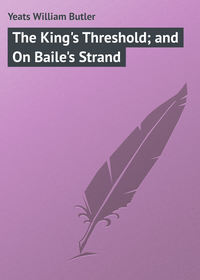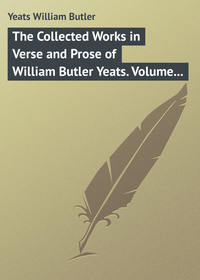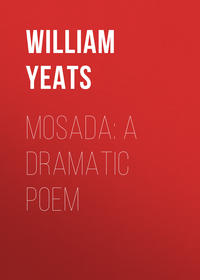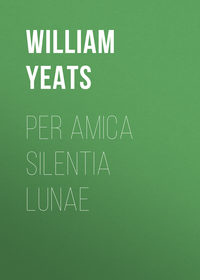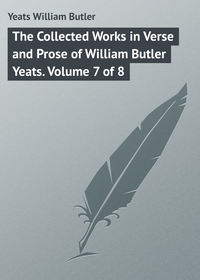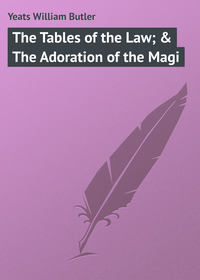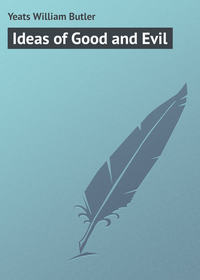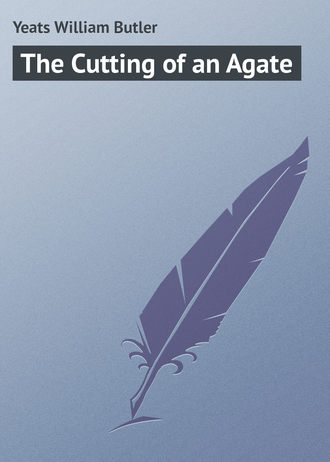 полная версия
полная версияThe Cutting of an Agate
To speak of one’s emotions without fear or moral ambition, to come out from under the shadow of other men’s minds, to forget their needs, to be utterly oneself, that is all the Muses care for. Villon, pander, thief and man-slayer, is as immortal in their eyes, and illustrates in the cry of his ruin as great a truth as Dante in abstract ecstasy, and touches our compassion more. All art is the disengaging of a soul from place and history, its suspension in a beautiful or terrible light, to await the Judgment, and yet, because all its days were a Last Day, judged already. It may show the crimes of Italy as Dante did, or Greek mythology like Keats, or Kerry and Galway villages, and so vividly that ever after I shall look at all with like eyes, and yet I know that Cino da Pistoia thought Dante unjust, that Keats knew no Greek, that those country men and women are neither so lovable nor so lawless as ‘mine author sung it me’; that I have added to my being, not my knowledge.
XIV
I wrote the most of these thoughts in my diary on the coast of Normandy, and as I finished came upon Mont Saint Michel, and thereupon doubted for a day the foundation of my school. Here I saw the places of assembly, those cloisters on the rock’s summit, the church, the great halls where monks, or knights, or men at arms sat at meals, beautiful from ornament or proportion. I remembered ordinances of the Popes forbidding drinking-cups with stems of gold to these monks who had but a bare dormitory to sleep in. Even when imagining, the individual had taken more from his fellows and his fathers than he gave; one man finishing what another had begun; and all that majestic fantasy, seeming more of Egypt than of Christendom, spoke nothing to the solitary soul, but seemed to announce whether past or yet to come an heroic temper of social men, a bondage of adventure and of wisdom. Then I thought more patiently and I saw that what had made these but as one and given them for a thousand years the miracles of their shrine and temporal rule by land and sea, was not a condescension to knave or dolt, an impoverishment of the common thought to make it serviceable and easy, but a dead language and a communion in whatever, even to the greatest saint, is of incredible difficulty. Only by the substantiation of the soul I thought, whether in literature or in sanctity, can we come upon those agreements, those separations from all else that fasten men together lastingly; for while a popular and picturesque Burns and Scott can but create a province, and our Irish cries and grammars serve some passing need, Homer, Shakespeare, Dante, Goethe and all who travel in their road with however poor a stride define races and create everlasting loyalties. Synge, like all of the great kin, sought for the race, not through the eyes or in history, or even in the future, but where those monks found God, in the depths of the mind, and in all art like his, although it does not command – indeed because it does not – may lie the roots of far-branching events. Only that which does not teach, which does not cry out, which does not persuade, which does not condescend, which does not explain, is irresistible. It is made by men who expressed themselves to the full, and it works through the best minds; whereas the external and picturesque and declamatory writers, that they may create kilts and bagpipes and newspapers and guidebooks, leave the best minds empty, and in Ireland and Scotland, England runs into the hole. It has no array of arguments and maxims, because the great and the simple (and the Muses have never known which of the two most pleases them) need their deliberate thought for the day’s work, and yet will do it worse if they have not grown into or found about them, most perhaps in the minds of women, the nobleness of emotion associated with the scenery and events of their country by those great poets who have dreamed it in solitude, and who to this day in Europe are creating indestructible spiritual races, like those religion has created in the East.
September 14th, 1910.THE TRAGIC THEATRE
I did not find a word in the printed criticism of Synge’s Deirdre of the Sorrows about the qualities that made certain moments seem to me the noblest tragedy, and the play was judged by what seemed to me but wheels and pulleys necessary to the effect, but in themselves nothing.
Upon the other hand, those who spoke to me of the play never spoke of these wheels and pulleys, but if they cared at all for the play, cared for the things I cared for. One’s own world of painters, of poets, of good talkers, of ladies who delight in Ricard’s portraits or Debussey’s music, all those whose senses feel instantly every change in our mother the moon, saw the stage in one way; and those others who look at plays every night, who tell the general playgoer whether this play or that play is to his taste, saw it in a way so different that there is certainly some body of dogma – whether in the instincts or in the memory, pushing the ways apart. A printed criticism, for instance, found but one dramatic moment, that when Deirdre in the second act overhears her lover say that he may grow weary of her; and not one – if I remember rightly – chose for praise or explanation the third act which alone had satisfied the author, or contained in any abundance those sentences that were quoted at the fall of the curtain and for days after.
Deirdre and her lover, as Synge tells the tale, returned to Ireland, though it was nearly certain they would die there, because death was better than broken love, and at the side of the open grave that had been dug for one and would serve for both, quarrelled, losing all they had given their life to keep. ‘Is it not a hard thing that we should miss the safety of the grave and we trampling its edge?’ That is Deirdre’s cry at the outset of a reverie of passion that mounts and mounts till grief itself has carried her beyond grief into pure contemplation. Up to this the play has been a Master’s unfinished work, monotonous and melancholy, ill-arranged, little more than a sketch of what it would have grown to, but now I listened breathless to sentences that may never pass away, and as they filled or dwindled in their civility of sorrow, the player, whose art had seemed clumsy and incomplete, like the writing itself, ascended into that tragic ecstasy which is the best that art – perhaps that life – can give. And at last when Deirdre, in the paroxysm before she took her life, touched with compassionate fingers him that had killed her lover, we knew that the player had become, if but for a moment, the creature of that noble mind which had gathered its art in waste islands, and we too were carried beyond time and persons to where passion, living through its thousand purgatorial years, as in the wink of an eye, becomes wisdom; and it was as though we too had touched and felt and seen a disembodied thing.
One dogma of the printed criticism is that if a play does not contain definite character, its constitution is not strong enough for the stage, and that the dramatic moment is always the contest of character with character.
In poetical drama there is, it is held, an antithesis between character and lyric poetry, for lyric poetry – however much it move you when read out of a book – can, as these critics think, but encumber the action. Yet when we go back a few centuries and enter the great periods of drama, character grows less and sometimes disappears, and there is much lyric feeling, and at times a lyric measure will be wrought into the dialogue, a flowing measure that had well-befitted music, or that more lumbering one of the sonnet. Suddenly it strikes us that character is continuously present in comedy alone, and that there is much tragedy, that of Corneille, that of Racine, that of Greece and Rome, where its place is taken by passions and motives, one person being jealous, another full of love or remorse or pride or anger. In writers of tragi-comedy (and Shakespeare is always a writer of tragi-comedy) there is indeed character, but we notice that it is in the moments of comedy that character is defined, in Hamlet’s gaiety let us say; while amid the great moments, when Timon orders his tomb, when Hamlet cries to Horatio ‘absent thee from felicity awhile,’ when Anthony names ‘Of many thousand kisses the poor last,’ all is lyricism, unmixed passion, ‘the integrity of fire.’ Nor does character ever attain to complete definition in these lamps ready for the taper, no matter how circumstantial and gradual the opening of events, as it does in Falstaff who has no passionate purpose to fulfill, or as it does in Henry the Fifth whose poetry, never touched by lyric heat, is oratorical; nor when the tragic reverie is at its height do we say, ‘How well that man is realised, I should know him were I to meet him in the street,’ for it is always ourselves that we see upon the stage, and should it be a tragedy of love we renew, it may be, some loyalty of our youth, and go from the theatre with our eyes dim for an old love’s sake.
I think it was while rehearsing a translation of Les Fourberies de Scapin in Dublin, and noticing how passionless it all was, that I saw what should have been plain from the first line I had written, that tragedy must always be a drowning and breaking of the dykes that separate man from man, and that it is upon these dykes comedy keeps house. But I was not certain of the site (one always doubts when one knows no testimony but one’s own); till somebody told me of a certain letter of Congreve’s. He describes the external and superficial expressions of ‘humour’ on which farce is founded and then defines ‘humour’ itself, the foundation of comedy as a ‘singular and unavoidable way of doing anything peculiar to one man only, by which his speech and actions are distinguished from all other men,’ and adds to it that ‘passions are too powerful in the sex to let humour have its course,’ or as I would rather put it, that you can find but little of what we call character in unspoiled youth, whatever be the sex, for as he indeed shows in another sentence, it grows with time like the ash of a burning stick, and strengthens towards middle life till there is little else at seventy years.
Since then I have discovered an antagonism between all the old art and our new art of comedy and understand why I hated at nineteen years Thackeray’s novels and the new French painting. A big picture of cocottes sitting at little tables outside a café, by some follower of Manet’s, was exhibited at the Royal Hibernian Academy while I was a student at a life class there, and I was miserable for days. I found no desirable place, no man I could have wished to be, no woman I could have loved, no Golden Age, no lure for secret hope, no adventure with myself for theme out of that endless tale I told myself all day long. Years after I saw the Olympia of Manet at the Luxembourg and watched it without hostility indeed, but as I might some incomparable talker whose precision of gesture gave me pleasure, though I did not understand his language. I returned to it again and again at intervals of years, saying to myself, ‘some day I will understand’; and yet, it was not until Sir Hugh Lane brought the Eva Gonzales to Dublin, and I had said to myself, ‘How perfectly that woman is realised as distinct from all other women that have lived or shall live’ that I understood I was carrying on in my own mind that quarrel between a tragedian and a comedian which the Devil on Two Sticks in Le Sage showed to the young man who had climbed through the window.
There is an art of the flood, the art of Titian when his Ariosto, and his Bacchus and Ariadne, give new images to the dreams of youth, and of Shakespeare when he shows us Hamlet broken away from life by the passionate hesitations of his reverie. And we call this art poetical, because we must bring more to it than our daily mood if we would take our pleasure; and because it delights in picturing the moment of exaltation, of excitement, of dreaming (or in the capacity for it, as in that still face of Ariosto’s that is like some vessel soon to be full of wine). And there is an art that we call real, because character can only express itself perfectly in a real world, being that world’s creature, and because we understand it best through a delicate discrimination of the senses which is but entire wakefulness, the daily mood grown cold and crystalline.
We may not find either mood in its purity, but in mainly tragic art one distinguishes devices to exclude or lessen character, to diminish the power of that daily mood, to cheat or blind its too clear perception. If the real world is not altogether rejected, it is but touched here and there, and into the places we have left empty we summon rhythm, balance, pattern, images that remind us of vast passions, the vagueness of past times, all the chimeras that haunt the edge of trance; and if we are painters, we shall express personal emotion through ideal form, a symbolism handled by the generations, a mask from whose eyes the disembodied looks, a style that remembers many masters, that it may escape contemporary suggestion; or we shall leave out some element of reality as in Byzantine painting, where there is no mass, nothing in relief, and so it is that in the supreme moment of tragic art there comes upon one that strange sensation as though the hair of one’s head stood up. And when we love, if it be in the excitement of youth, do we not also, that the flood may find no stone to convulse, no wall to narrow it, exclude character or the signs of it by choosing that beauty which seems unearthly because the individual woman is lost amid the labyrinth of its lines as though life were trembling into stillness and silence, or at last folding itself away? Some little irrelevance of line, some promise of character to come, may indeed put us at our ease, ‘give more interest’ as the humour of the old man with the basket does to Cleopatra’s dying; but should it come as we had dreamed in love’s frenzy to our dying for that woman’s sake, we would find that the discord had its value from the tune.
Nor have we chosen illusion in choosing the outward sign of that moral genius that lives among the subtlety of the passions, and can for her moment make her of the one mind with great artists and poets. In the studio we may indeed say to one another ‘character is the only beauty,’ but when we choose a wife, as when we go to the gymnasium to be shaped for woman’s eyes, we remember academic form, even though we enlarge a little the point of interest and choose “a painter’s beauty,” finding it the more easy to believe in the fire because it has made ashes.
When we look at the faces of the old tragic paintings, whether it is in Titian or in some painter of medieval China, we find there sadness and gravity, a certain emptiness even, as of a mind that waited the supreme crisis (and indeed it seems at times as if the graphic art, unlike poetry which sings the crisis itself, were the celebration of waiting). Whereas in modern art, whether in Japan or Europe, ‘vitality’ (is not that the great word of the studios?), the energy, that is to say, which is under the command of our common moments, sings, laughs, chatters or looks its busy thoughts.
Certainly we have here the Tree of Life and that of the knowledge of Good and Evil which is rooted in our interests, and if we have forgotten their differing virtues it is surely because we have taken delight in a confusion of crossing branches. Tragic art, passionate art, the drowner of dykes, the confounder of understanding, moves us by setting us to reverie, by alluring us almost to the intensity of trance. The persons upon the stage, let us say, greaten till they are humanity itself. We feel our minds expand convulsively or spread out slowly like some moon-brightened image-crowded sea. That which is before our eyes perpetually vanishes and returns again in the midst of the excitement it creates, and the more enthralling it is, the more do we forget it.
August, 1910.JOHN SHAWE-TAYLOR
There is a portrait of John Shawe-Taylor by a celebrated painter in the Dublin Municipal Gallery, but painted in the midst of a movement of the arts that exalts characteristics above the more typical qualities, it does not show us that beautiful and gracious nature. There is an exaggeration of the hollows of the cheeks and of the form of the bones which empties the face of the balance and delicacy of its lines. He was a very handsome man, as women who have imagination and tradition understand those words, and had he not been so, mind and character had been different. There are certain men, certain famous commanders of antiquity, for instance, of whose good looks the historian always speaks, and whose good looks are the image of their faculty; and these men copying hawk or leopard have an energy of swift decision, a power of sudden action, as if their whole body were their brain.
A few years ago he was returning from America, and the liner reached Queenstown in a storm so great that the tender that came out to it for passengers returned with only one man. It was John Shawe-Taylor, who had leaped as it was swept away from the ship.
The achievement that has made his name historic and changed the history of Ireland came from the same faculty of calculation and daring, from that instant decision of the hawk, between the movement of whose wings and the perception of whose eye no time passes capable of division. A proposal for a Land Conference had been made, and cleverer men than he were but talking the life out of it. Every argument for and against had been debated over and over, and it was plain that nothing but argument would come of it. One day we found a letter in the daily papers, signed with his name, saying that a conference would be held on a certain date, and that certain leaders of the landlords and of the tenants were invited. He had made his swift calculation, probably he could not have told the reason for it, a decision had arisen out of his instinct. He was then almost an unknown man. Had the letter failed, he would have seemed a crack-brained fool to his life’s end; but the calculation of his genius was justified. He had, as men of his type have often, given an expression to the hidden popular desires; and the expression of the hidden is the daring of the mind. When he had spoken, so many others spoke that the thing was taken out of the mouths of the leaders, it was as though some power deeper than our daily thought had spoken, and men recognised that common instinct, that common sense which is genius. Men like him live near this power because of something simple and impersonal within them which is, as I believe, imaged in the fire of their minds, as in the shape of their bodies and their faces.
I do not think I have known another man whose motives were so entirely pure, so entirely unmixed with any personal calculation, whether of ambition, of prudence or of vanity. He caught up into his imagination the public gain as other men their private gain. For much of his life he had seemed, though a good soldier and a good shot, and a good rider to hounds, to care deeply for nothing but religion, and this religion, so curiously lacking in denominational limits, concerned itself alone with the communion of the soul with God. Such men, before some great decision, will sometimes give to the analysis of their own motive the energy that other men give to the examination of the circumstances wherein they act, and it is often those who attain in this way to purity of motive who act most wisely at moments of great crisis. It is as though they sank a well through the soil where our habits have been built, and where our hopes take root and are again uprooted, to the lasting rock and to the living stream. They are those for whom Tennyson claimed the strength of ten, and the common and clever wonder at their simplicity and at a triumph that has always an air of miracle about it.
Some two years ago Ireland lost a great æsthetic genius, and it may be it should mourn, as it must mourn John Synge always, that which is gone from it in this man’s moral genius. And yet it may be that, though he died in early manhood, his work was finished, that the sudden flash of his mind was of those things that come but seldom in a lifetime, and that his name is as much a part of history as though he had lived through many laborious years.
July 1, 1911.EDMUND SPENSER
I
We know little of Spenser’s childhood and nothing of his parents, except that his father was probably an Edmund Spenser of north-east Lancashire, a man of good blood and ‘belonging to a house of ancient fame.’ He was born in London in 1552, nineteen years after the death of Ariosto, and when Tasso was about eight years old. Full of the spirit of the Renaissance, at once passionate and artificial, looking out upon the world now as craftsman, now as connoisseur, he was to found his art upon theirs rather than upon the more humane, the more noble, the less intellectual art of Malory and the Minstrels. Deafened and blinded by their influence, as so many of us were in boyhood by that art of Hugo, that made the old simple writers seem but as brown bread and water, he was always to love the journey more than its end, the landscape more than the man, and reason more than life, and the tale less than its telling. He entered Pembroke College, Cambridge, in 1569, and translated allegorical poems out of Petrarch and Du Bellay. To-day a young man translates out of Verlaine and Verhaeren; but at that day Ronsard and Du Bellay were the living poets, who promised revolutionary and unheard-of things to a poetry moving towards elaboration and intellect, as ours – the serpent’s tooth in his own tail again – moves towards simplicity and instinct. At Cambridge he met with Hobbinol of The Shepheards Calender, a certain Gabriel Harvey, son of a rope-maker at Saffron Walden, but now a Fellow of Pembroke College, a notable man, some five or six years his elder. It is usual to think ill of Harvey because of his dislike of rhyme and his advocacy of classical metres, and because he complained that Spenser preferred his Faerie Queene to the Nine Muses, and encouraged Hobgoblin ‘to run off with the Garland of Apollo.’ But at that crossroad, where so many crowds mingled talking of so many lands, no one could foretell in what bed he would sleep after nightfall. Milton was in the end to dislike rhyme as much, and it is certain that rhyme is one of the secondary causes of that disintegration of the personal instincts which has given to modern poetry its deep colour for colour’s sake, its overflowing pattern, its background of decorative landscape, and its insubordination of detail. At the opening of a movement we are busy with first principles, and can find out everything but the road we are to go, everything but the weight and measure of the impulse, that has come to us out of life itself, for that is always in defiance of reason, always without a justification but by faith and works. Harvey set Spenser to the making of verses in classical metre, and certain lines have come down to us written in what Spenser called ‘Iambicum trimetrum.’ His biographers agree that they are very bad, but, though I cannot scan them, I find in them the charm of what seems a sincere personal emotion. The man himself, liberated from the minute felicities of phrase and sound, that are the temptation and the delight of rhyme, speaks of his Mistress some thought that came to him not for the sake of poetry, but for love’s sake, and the emotion instead of dissolving into detached colours, into ‘the spangly gloom’ that Keats saw ‘froth and boil’ when he put his eyes into ‘the pillowy cleft,’ speaks to her in poignant words as if out of a tear-stained love-letter:
‘Unhappie verse, the witnesse of my unhappie state,Make thy selfe fluttring winge for thy fast flyingThought, and fly forth to my love wheresoever she be.Whether lying restlesse in heavy bedde, or elseSitting so cheerlesse at the cheerful boorde, or elsePlaying alone carelesse on her heavenlie virginals.If in bed, tell hir that my eyes can take no rest;If at boorde tell her that my mouth can eat no meateIf at her virginals, tell her that I can heare no mirth.’II
He left College in his twenty-fourth year, and stayed for a while in Lancashire, where he had relations, and there fell in love with one he has written of in The Shepheards Calender as ‘Rosalind, the widdowes daughter of the Glenn,’ though she was, for all her shepherding, as one learns from a College friend, ‘a gentlewoman of no mean house.’ She married Menalchus of the Calender and Spenser lamented her for years, in verses so full of disguise that one cannot say if his lamentations come out of a broken heart or are but a useful movement in the elaborate ritual of his poetry, a well-ordered incident in the mythology of his imagination. To no English poet, perhaps to no European poet before his day, had the natural expression of personal feeling been so impossible, the clear vision of the lineaments of human character so difficult; no other’s head and eyes had sunk so far into the pillowy cleft. After a year of this life he went to London, and by Harvey’s advice and introduction entered the service of the Earl of Leicester, staying for a while in his house on the banks of the Thames; and it was there in all likelihood that he met with the Earl’s nephew, Sir Philip Sidney, still little more than a boy, but with his head full of affairs of state. One can imagine that it was the great Earl or Sir Philip Sidney that gave his imagination its moral and practical turn, and one imagines him seeking from philosophical men, who distrust instinct because it disturbs contemplation, and from practical men who distrust everything they cannot use in the routine of immediate events, that impulse and method of creation that can only be learned with surety from the technical criticism of poets, and from the excitement of some movement in the artistic life. Marlowe and Shakespeare were still at school, and Ben Jonson was but five years old. Sidney was doubtless the greatest personal influence that came into Spenser’s life, and it was one that exalted moral zeal above every other faculty. The great Earl impressed his imagination very deeply also, for the lamentation over the Earl of Leicester’s death is more than a conventional Ode to a dead patron. Spenser’s verses about men, nearly always indeed, seem to express more of personal joy and sorrow than those about women, perhaps because he was less deliberately a poet when he spoke of men. At the end of a long beautiful passage he laments that unworthy men should be in the dead Earl’s place, and compares them to the fox – an unclean feeder – hiding in the lair ‘the badger swept.’ The imaginer of the festivals of Kenilworth was indeed the fit patron for him, and alike, because of the strength and weakness of Spenser’s art, one regrets that he could not have lived always in that elaborate life, a master of ceremony to the world, instead of being plunged into a life that but stirred him to bitterness, as the way is with theoretical minds in the tumults of events they cannot understand. In the winter of 1579-80 he published The Shepheards Calender, a book of twelve eclogues, one for every month of the year, and dedicated it to Sir Philip Sidney. It was full of pastoral beauty and allegorical images of current events, revealing too that conflict between the æsthetic and moral interests that was to run through well-nigh all his works, and it became immediately famous. He was rewarded with a place as private secretary to the Lord Lieutenant, Lord Grey de Wilton, and sent to Ireland, where he spent nearly all the rest of his life. After a few years there he bought Kilcolman Castle, which had belonged to the rebel Earl of Desmond, and the rivers and hills about this castle came much into his poetry. Our Irish Aubeg is ‘Mulla mine, whose waves I taught to weep,’ and the Ballyvaughan Hills, it has its rise among ‘old Father Mole.’ He never pictured the true countenance of Irish scenery, for his mind turned constantly to the courts of Elizabeth and to the umbrageous level lands, where his own race was already seeding like a great poppy:




